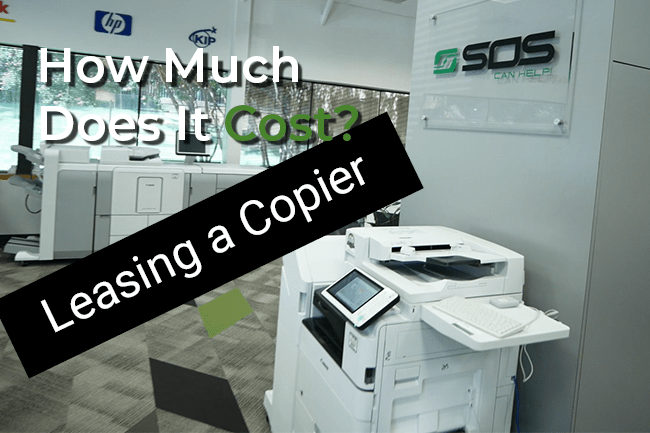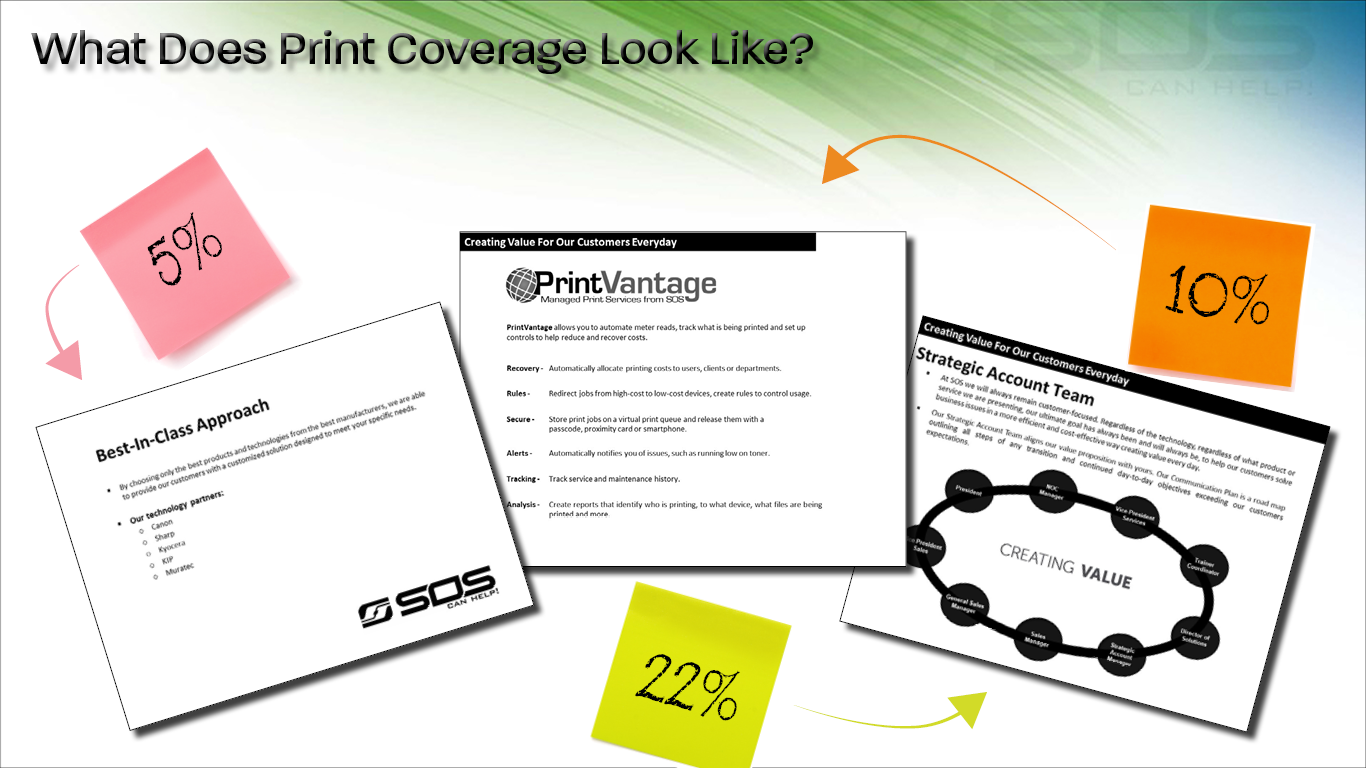
10 MIN READ | OFFICE COPIER COST
Is there anything more infuriating than doing a search engine query only to arrive at a link and find that the source isn’t going to give you an answer but invites you to call or email them for “more information?”
Groan.
Okay, so from the outset, let’s be honest; that won’t be what happens here. Instead, you’re going to get thorough answers, with answers varying depending circumstances.
You being a savvy business person, though, you might also want to dig deeper, with questions like “what if my machine breaks down?” “Who fixes it?” Also, "what’s that going to cost?”
The goal here is to guide you making an informed decision, because if you know what you’re doing when leasing or purchasing a copier, you’ll save money. So with that, let’s dive in.
Not a lot of time? Skip to what you need:
What Should I Consider When Purchasing a Copier?
Copier Cost Considerations
How Copiers Save Offices Money
How Do I Choose a Copier Vendor?
What Should I Consider When Purchasing a Copier?
Remember when a multi-disk CD player was a “must have” when buying a car last decade? Remember when “heated seats” were alluring five years ago? Now vehicles boast of interactive bluetooth entertainment options and, move over, heated seats; make room for “cooled seating,” too.
The point? When shopping around for technological options, it’s wise not to just rely on what your “must haves” were the last time you were buying.
If you haven't purchased one before or it's been a few years since your last purchase, there are changes to make note of. In fact, we wrote an article on this topic in 2017, and again in 2021, but here we are again, with an update.
If you’re wondering why it’s difficult to get a straightforward answer to your unique copier cost question(s), it’s really simple: a variety of factors determine the answer. It’s also helpful to realize that copiers have evolved so much in just the last decade, let alone the invention of the printing press.

Consider a car purchase.
Back to the car-buying analogy: when you’re looking for your next vehicle, you weigh a variety of factors:
- Price
- Make and Model
- Features
- New vs. Used
- Maintenance Costs
Believe it or not, the considerations for your next copier can be identical. If you’ve rented an “economy” car to save money but have a luxury sedan at home, surely you’ve noticed the lack of features in a Ford Fiesta you rented at the airport, right? That’s why the Fiesta’s one of the least expensive new cars in the industry. Outside of “it drives” the features are minimal. They’re also inexpensive to make - and thus more costly to maintain should you decide to do so instead of move on to the next vehicle purchase.
Makes sense that for a work trip, you might not need a brand new high-end sedan or SUV; similarly, you may not currently need a high-end copier. Obviously cost is an important consideration, but making sure your machine does what you need it to do also has to be a top priority.
There's no point in purchasing a copier that can't complete the necessary functions required specifically FOR your business, just as it makes no sense to buy a copier with features your business has no use for.
So we’re going to break down the costs associated with the following considerations:
- Equipment/Hardware
- Features
- Black and White vs Color Copies
- Service
Copier Cost Considerations

The following numbers are total costs for individuals wishing to purchase a machine outright and do not include higher end production printers. Prices may vary between vendors, however, this guide illuminates typical costs.
Copier Equipment/Hardware Costs ($2,500 - $60,000+):
How’s that for sticker shock?
Fortunately, most service companies offer lease programs where you can make reasonable payments each month on your office copier. Reviewing benefits of a lease program appear later in the article.
What model of copier you choose is very important to consider. Your copier will need to be able to keep up with the demand you place on it, after all. The argument could be made that this is a higher priority consideration than price. Why?
Consider: if your machine can only handle 100,000 impressions (pages) before service, but you need to run 500,000 impressions every month, you may spend more money to service the machine than the higher priced and upgraded model might’ve cost.
Another perspective: maybe a combination of copier model upgrades and/or additional copiers can solve volume problems. That said, that nay cause convenience issues, so there’s another factor to consider.i This is where finding an appropriate balance will best serve the needs of your budget.
Features ($200-$2,000):
Once you think you’ve zeroed in on the machine(s) to handle the monthly volume your office requires, it’s time to identify the “extra functions” - the features - you’d like or have to have for your business. Sure it’s called a “copier,” but most offices require more than basic copy functions from their machines - hence the term “multi-function printer.” Today’s copiers, after all, offer so much more than just photocopying documents.
Copiers can send emails, scan documents directly to shared folders (or email directly) and edit documents directly from their displays. Some can even intuitively sort individual receipts scanned during the same job, and all offer significant upgrades to their security.
Features to consider include:
- Finishers: staplers or corner folders; a necessity for most offices that does not come standard on machines
- Hole Punch: most are available in single or triple whole punches depending on what is required by the user. That’s right, throw away that bulky hole punch device!
- Letter Folding: the ability to fold letters/documents, increasing efficiency in your office by not wasting time on simple manual labor
- Booklet Making: a combination of various features that allow small booklets to be created through folding, hole punch, and stapling features
- Faxing: don’t laugh; it’s still commonly used by firms transmitting a great deal of sensitive information (ex: hospitals, law office, CPA's, etc.)
- Large Capacity Paper Tray: increases the standard capacity of the tray to allow for more reams of paper to be loaded, increasing office efficiency
- Document Feeder: a necessity for most copier users, document feeders can be configured to include single pass and reversing options
- Fiery: an important add-on for organizations in need of the highest level of color matching available for their print media
- Card Readers: allows for security cards to be implemented for users to gain access to a machine, particularly helpful in situations where security must be higher or department spending is more closely tracked
- Follow-Me-Printing: the ability to create a print job from a desktop computer or smartphone and release the job from any machine connected within an organization's network
- Software Upgrades: this may include popular software like:
- e-Copy
- Uniflow
- Drive
- Infodynamics
How much of that can you also conclude eliminates human productivity time, too? Sometimes an expense can actually be a savings generator.
Black and White vs. Color Copies:
It's probably no surprise that there is a substantial difference between the cost of color copies and black & white. Color copies, after all, require a variety of toners to make a variety of colors. Color toner also isn't sold in as large a quantity as black toner, so it's going to be more expensive for manufacturers to produce, too.
Black & white copies are fractions of a penny per copy, where as color copies can be a few cents per copy, so you have to carefully evaluate whether or not color is what your business requires. Maybe a combination of mono (black and white) and color copiers is the better solution.
Service ($0.01-$0.10 per page):
Copier service pricing can vary widely from dealer-to-dealer, and even wider from dealer-to-manufacturer (more on that later). The big difference here occurs when comparing different machines.
If you’re thinking “service is service,” you’re right … and wrong.
It's very possible for smaller, less expensive machines to ultimately cost more than a larger, more expensive machine, adding maintenance and manpower costs to meet goals the machine simply isn’t designed for.
Pretend you're comparing the overall costs of two machines that can each meet your business needs this way:
Machine A is smaller and less expensive with a monthly lease cost of $170. Machine B is larger, has a quicker production speed, and has a monthly cost of $280. It would make sense to purchase Machine A if you know it can cover your needs.
This is where efficiency comes in, though.
Smaller machines break down more often, escalating service & repair costs. Dealers typically include service with the per-print costs, but your per-print cost will often be higher with a less efficient machine because the dealer knows that it's going to need service more often.
The difference can be several hundred dollars more per month, per machine (more on that, later, as well)!
Older or used copier machines can also have higher service costs, but there may also be value in saving on the equipment purchase. Ultimately, it comes down to a business' needs. Be discerning enough to know how many copies have been made on a used machine before you buy. Don’t take “we’re not sure” for an answer. The vendor will be able to show you that on the display screen.
Another vehicle analogy: copiers are a lot like cars: hgh copy counts are the equivalent to high mileage and you should do your research on what an appropriate number of copies is for that model based on the year it was built.
How Copiers Save Offices Money
We’ve been focusing so much on cost and only hinting at cost-savings, but make no mistake: the right copier selection can save a company money, too.
There are those businesses that try to avoid the “big printer” cost mostly by instead employing a small army of desktop printers. Whether they are inkjet or toner-based, desktop printers simply can't match the efficiency of a copier.
Let's break this down in two parts:
Inkjet vs Toner Printing
If you've ever been to an office supply store and purchased an ink cartridge, did you notice the “page-yield” indicator on the side of the box? “Page-yield” simply means the estimated number of pages that a cartridge can be expected to print.
What most people don't realize, though, is that page-yield is based on a 5% coverage ratio, meaning that 5% of the page is covered in ink.

As you can see, 5% doesn't get you a whole lot of coverage. You can imagine your normal coverage being closer to 10% on average.
Anecdotally speaking, we’ve determined that page coverage is closer to 6% for our customers, but still, that's more than the 5% that's used to sell you on a cartridge. 1% doesn't seem like much, but the two charts below illustrate the difference it can make to your bottom line.
| Monthly Volume |
5% Coverage |
Total Monthly Cost for Supply per Machine |
| 2,000 | .0258 | $51.60 |
| 3,000 | .0258 | $77.49 |
| 4,000 | .0258 | $103.20 |
| Monthly Volume |
6% Coverage |
Total Monthly Cost for Supply per Machine |
| 2,000 | .0323 | $64.60 |
| 3,000 | .0323 | $96.90 |
| 4,000 | .0323 | $129.20 |
| Monthly Volume |
10% Coverage |
Total Monthly Cost for Supply per Machine |
| 2,000 | .0516 | $103.20 |
| 3,000 | .0516 | $154.80 |
| 4,000 | .0516 | $206.40 |
Notably, there’s a significant price difference between the monthly costs of 5% vs 10% - the latter most likely being far closer to your company's average; but switching to toner isn’t cheaper.
Now there are some cost savings when you choose toner, but the real cost savings come when you purchase your toner as part of a service contract.
Why is that, you ask? Let’s call it the “Costco factor.”
Like a Costco shopper buying in bulk, copier dealers have significant bulk buying power when it comes to supplies, and part of that savings is passed on to the customer.
Remember: a retailer is trying to make as much money from you every time you walk into their store or order from them online. When was the last time they gave you a discount just because you purchased a lot of toner or ink at one time?
Never?
Retailers definitely benefit from purchasing in bulk, but because they don't actually know if you’re returning, they aren't likely passing that discount on to you.
Establishing copier service through a dealer requires a service contract, and that encourages them to pass those savings on to you - their customer - as a way of keeping your business for the long term. They want your business and they will use the leverage they have to secure it.
A copier service agreement allows you to more easily manage costs and keeps you covered when (not if) a machine inevitably goes down. Businesses often discover they can pay less than retail with the added benefit of regular maintenance and on-demand service at no additional cost.
Additional savings come from pulling the trigger on features previously mentioned: auto-stapling, corner-folding, hole punching, letter-folding and booklet making. When a machine can do tasks a human would otherwise have to - and let’s be honest - in a less cumbersome manner, workplace productivity enjoys a boost.
How Do I Choose a Copier Vendor?
Let’s cut to the chase: most copiers perform the basic functions at a very comparable level.
RELATED: How to Choose a Copier Dealer
Of course there are subtle differences, but in many cases, the differences aren’t substantive enough to truly define which office copier is the best for your business. The service you receive, however, is a vastly more important factor, and cost factor to evaluate before choosing a copier dealer.
Doing business with a manufacturer - cutting out the local vendor - doesn’t come with the benefits (most notably, cost savings) you’d expect. In fact, we address that, dispelling common myths between copier manufacturers and dealers.
A business needing copier service also needs a trustworthy company offering that service; one with a track record of exceptional service. As Benjamin Franklin once said ...
"The bitterness of poor quality remains long after the sweetness of low price is forgotten." - Benjamin Franklin
Posted by Bryan Ammons

Bryan Ammons is the President and Owner of Standard Office Systems of Atlanta where he began his career as a part-time employee in 1973. SOS is a leading provider of office technology including managed IT services, copiers, printers, and business phone systems. Bryan has served on the board of the Copier Dealers Association for 11 years, including two as President. Additional, he served on the Dealer Advisory Councils of HP, Ricoh, Sharp, US Bank, and Great America Leasing.


